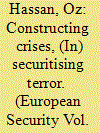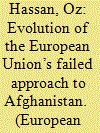| Srl | Item |
| 1 |
ID:
101011


|
|
|
|
|
| Publication |
2010.
|
| Summary/Abstract |
The European Union's (EU) counter-terrorism strategy has been particularly dynamic, developing as a result of 'crises' and subsequent post-crisis narrations. The events of 11 September 2001, and the Madrid and London bombings have proved to provide moments of punctuation from which policy evolution and institutionalisation has followed. As a result of such crises, the EU has increasingly regarded terrorism as a direct challenge to the Union's role as a security actor and sought to institutionalise a diverse range of security governance technologies across its multiple pillars. Such an approach is noticeable for its qualitative difference compared to EU strategy pursued throughout the end of the twentieth century, and demonstrates an increased willingness for the EU to assert its role in the world. Yet, what is highly noticeable from the EU strategy and the proliferation of security governance technologies is the manner in which the EU has securitised 'terrorism' in the pursuit of internal, external and normative objectives. As a consequence, the EU has inflated the threat posed by terrorism, and increasingly attempted to 'Europeanise' its response. Evident in such a strategy however, is the manner in which counter-terrorism practices can generate greater insecurity inside and outside of the Union.
|
|
|
|
|
|
|
|
|
|
|
|
|
|
|
|
| 2 |
ID:
173945


|
|
|
|
|
| Summary/Abstract |
This article provides a genealogical account of European actorness in Afghanistan. It argues that European agreement towards facilitating modernisation and development in Afghanistan was initiated with aid and trade, evolving into humanitarianism in the 1990s, and reconstruction and democratisation in the 2000s. The European Union has had a positive impact on Afghanistan, focusing on humanitarianism, but its multilateral and programme level approach to reconstruction and democratisation has failed to meet the EU’s stated objectives. By promoting the flawed “Bonn Model”, the EU is proportionally culpable for failed international attempts to reconstruct Afghanistan; even though the United States has been the primary international actor. Drawing a series of broader lessons, such as tensions between Atlantic solidarity and European integration, and the limitations of the European crisis management, the article demonstrates how European policy has been shaped by crises inside Afghanistan and the larger geopolitical crises these have generated. These have contemporary importance as history suggests that as the US withdraws its commitment to Afghanistan, the EU will have a very significant role in attempting to fill a humanitarian vacuum.
|
|
|
|
|
|
|
|
|
|
|
|
|
|
|
|